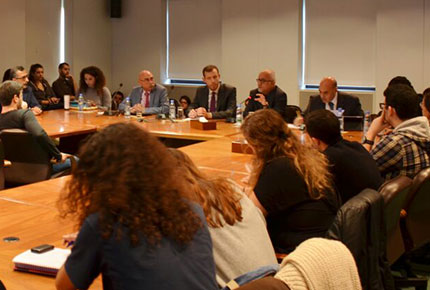Students and experts delve into the Islamic State
LAU professors and Middle East expert walk Humanities and Social Sciences students through the world of the self-proclaimed caliphate.

Students were intrigued and deluged by the plethora of information and analysis offered by the panelists.
A conference on “The Notion of Islamic State in the Middle East” was recently held at LAU. Attended by students of the departments of humanities and social sciences, the event was moderated by professor of political science Sami Baroudi and considered the language, history and politics of Islamic rule across the region and caliphates through the ages.
Dr. Vahid Behmardi, associate professor at the Humanities, spoke of what he saw as a contradiction in the use of the terms caliph and amir to describe the current head of the Islamic State, Abu Bakr Al-Baghdadi. “All references to the word caliph made in the Quran relate to prophethood,” he said. “In reference to the successors of the prophet Mohamed, the term caliph is used by Sunni Muslims to refer to leaders who were chosen collectively by the people.”
Neither a prophet nor a leader chosen by the people, Al-Baghdadi by this reasoning does not fit the historical definition of a caliph. Additionally, given that he doesn’t only reign over Muslim populations, Al-Baghdadi does not fit the classical definition of the term amir al mou’mineen (commander of the believers).
The abundant history lesson continued with Dr. Selim Deringil, a professor of Ottoman history, who suggested that the desire of the Ottoman Sultan Selim I to reign over a wider population was “one foundation of the myth of a caliphate. Caliph had simply been one of many alternate titles given to rulers at the time, but after the first loss of a large Muslim population to a foreign state in the 18th century, the Ottoman Sultan bestowed upon himself the title of caliph declaring himself the protector of all Muslims.” This declaration, said Deringil, was precipitated by the Russian Czar’s declaration that he was the protector of all Christians.
The Ottoman caliphate spanned many countries for centuries, but in the early 20th century — a time when the great British colonial power promoted pan-Arabism as a means of weakening pan-Islamism — the caliphate was abolished and declared to have been a political and not religious entity.
The current Islamic State was also born at a time of political instability in the region and is, according to third panelist Peter Harling, a Middle East expert with the International Crisis Group (ICG), “an opportunistic movement that speaks to profound sentiments in a region in times of flux.”
Explaining their relative success at dominating parts of the region, Harling says that the Islamic State “offers a greater degree of predictability at present than the unruly security structures in the region … but their ability to keep up the momentum is overstated.”
That said, Harling believes the Islamic State is here to stay, but will be one of many other phenomena developing in a region that has struggled through a many-fold crisis over the past four years. “The Islamic State covered our considerable failures to understand what was really at play in the region and saved us from considering its many complexities,” he said. While Al-Baghdadi’s caliphate does not itself offer a response to those complexities, it does continue to contribute to the process of devolution of power.
More
Latest Stories
- Into the Psychology of Justice
- Alumnus Zak Kassas on Navigation, Spoofing and the Future of GPS
- Hearing Between the Lines
- LAU Hematology Conference 2025: Advancing Science Through Interdisciplinary Exchange
- Dr. Chaouki T. Abdallah Invested as LAU’s 10th President
- LAU Guides Its Students Through the Code of Conduct
- Innovative Procedure at LAU Medical Center–Rizk Hospital Signals Hope for a Patient With a Congenital Disease
- LAU’s Inaugural PodChat Session Addresses AI Detection in the Classroom

